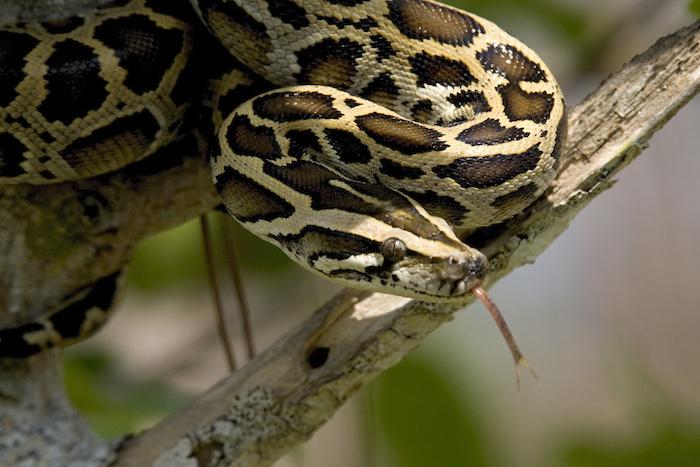
Officials with Public Employees for Environmental Responsibility believe the National Park Service should block the Python Challenge 2016 from being conducted inside Everglades National Park/NPS
A plan to open Everglades National Park up to the "Python Challenge" early next year is both wrong and probably illegal, according to Public Employees for Environmental Responsibility, which wants the National Park Service to prevent the hunt from being conducted within the park.
While the snake hunt is intended to reduce the number of non-native Burmese pythons in south Florida, PEER officials maintain the hunt won't likely reduce the number of pythons in the park, that it's unsupported by scientific review, and could lead to similar "hunts" in other parks with non-native species problems, such as Great Smoky Mountains National Park where a feral pig population lives.
The first Python Challenge, sponsored by the Florida Fish and Wildlife Conservation Commission, was held in 2013 in lands outside the national park. It led to the capture of 68 snakes, including one more than 14 feet in length.
In supporting next year's hunt, Everglades Superintendent Pedro Ramos said he and his staff "look forward to expanding access into the park and to providing more opportunities for members of the public to become approved authorized python agents."
However, according to PEER, "only once in NPS history has Congress approved the use of deputized agents for removal of wildlife – back in 1950, to reduce the elk population in Grand Teton National Park."
"The Everglades python hunt of 2016 is a misguided publicity stunt that would not improve, let alone solve, the python problem,” said Jeff Ruch, PEER's executive director. “This would set a terrible precedent for no good reason. Unfortunately, what this episode really reflects is an advancing institutional decay in the quality of national park leadership.”
The aim of the 2016 Python Challenge™ is to promote Everglades conservation through invasive species removal, and the FWC and the Fish and Wildlife Foundation of Florida, Inc., see the hunt as one way to provide training to members of the public so they can help. Training events will teach participants how to identify, report, and then safely and humanely capture Burmese pythons.
While no one disputes that pythons introduced into Everglades National Park are a non-native, invasive species that has altered the park ecosystem, PEER said in a release issued Tuesday, the organization believes some significant obstacles stand in the way of the plan:
* As in most national parks, it is illegal for anyone other than National Park Service employees or contractors to hunt animals of any kind inside Everglades National Park;
* The park has not done the environmental reviews, together with opportunities for public comment, required by federal law, and;
* Despite claiming that the snakes collected will aid scientific research, there is no study design or research proposition to be validated.
Superintendent Ramos' comments in support of the hunt, said PEER's Mr. Ruch, are misguided.
“Superintendent Ramos appears to be making this up as he goes along, but national parks are not supposed to be run from the seat of someone’s pants,” he said. “Most people already know that Everglades has a python problem, but it is utterly mysterious why putting on a contest will avert the arrival of more invasive species.
"... The Everglades python hunt of 2016 is a misguided publicity stunt that would not improve, let alone solve, the python problem,” added Mr. Ruch. “This would set a terrible precedent for no good reason. Unfortunately, what this episode really reflects is an advancing institutional decay in the quality of national park leadership.”



Comments
One idea would be to have the park do some environmental compliance on the issue. As far as I can tell, there has been none. This idea deserves at least an Environmental Assessment, if not an EIS. Opening a park to hunting is certainly a significant action and is controversial.
Rick - can you even conceive of a negative enviromental impact? Sometimes common sense needs to overcome beauracracy.
EC--It's not beauracracy; it's the law.
"it's the law. "
Is it? What is the trigger point that requires an EIS? If they pull invasive weeds do they need an EIS?
This sounds like PEER advocating on behalf of the union. I suspect that if public employees were hired to eradicate the snakes they wouldn't have an issue.
They have been hiring professional hog hunters in the Smokies for years. Many of us have come upon them. It is common knowledge here. Not that they have made any dent whatsoever in the population. They are like coyotes. You can't kill enough of them. I suspect the pythons are a similarly no eradicatable pest.
I asked today, Eric about your weed/EIS question. There are books of regulations for compliance specialists to be aware of. Specifically to your question,. some weeds, some places yes, some weeds some places no.